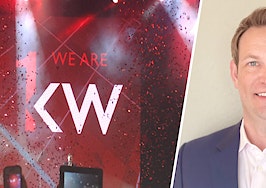New markets require new approaches and tactics. Experts and industry leaders take the stage at Inman Connect New York in January to help navigate the market shift — and prepare for the next one. Meet the moment and join us. Register here.
It is now nearly five years since Gary Keller declared real estate franchisor Keller Williams a technology company and disavowed the label of real estate company.
Now, Keller Williams no longer shies away from being a real estate company but is keeping its self-identification as a technology company, according to Chris Cox, who is coming up on the second anniversary of his hiring as chief technology and digital officer for Keller Williams holding company KWx.
Cox joined KWx from the banking and financial services industries and came by his interest in technology and innovation honestly — his father was a lead engineer for NASA.
In advance of his appearance at Inman Connect New York this month, Inman caught up with Cox to discuss how that influenced what he does today and where he sees tech in real estate going.
This interview has been edited for length and clarity.
Inman: How did your father’s background as a lead engineer for NASA influence what you do today?
Cox: Well, he was a big inspiration for me. My dad was involved at the outset of the Gemini, Apollo and Shuttle space programs. My model growing up was somebody who went to work every day to solve really, really challenging things. Obviously, getting a man on the moon and dealing with all the challenges with doing something that had never been done before. What I found really compelling in my own life was how to harness the power of technology to help people live better lives. The phone that most people walk around with today has probably 1,000 or more times the power of all the technology to power getting a crew to the moon and allow a man to walk on the moon.
How do you think you’re doing that at Keller Williams, trying to solve things that haven’t been solved before?
I’m drawn to mission-driven organizations and Keller Williams is distinguished by how agent-centric it is. We’re here to make agents more successful, period. We’re here to make them more money, help them make more money or save time and ultimately to drive their success. Technology is a big, big piece of that. In today’s competitive environment, and particularly now with economic headwinds that the industry has seen in the last five or so years, technology is a real differentiator and it can allow our agents a distinct competitive advantage when they’re out there building portfolios of clients and working with clients.
So you’re the chief technology and digital officer. Could you explain a little bit about what that means?
I have responsibility for all of our traditional IT, engineering, development and architecture functions, so think of those as the core information technology functions, as well as product management. So how do we make decisions around what we’re building and how we’re building it? We call that product management design — the look and the feel, the user interface, all of those kinds of things.
What we refer to as data and advanced analytics, so that is managing all the data that comes off of all the transactions that Keller Williams agents are involved in as well as all the data that we collect just as part of managing a global franchise and brokerage business. And so all of that business intelligence and advanced analytic functions is within my area.
And then we also run an innovation function, which is really focused on what are the next generation-enabling technologies. How do we develop creative partnerships and joint ventures and look at M&A opportunities with emerging technology companies, new technologies in general, how do we sort of sift through everything that’s out there to make sure that we’re on the leading edge of innovation in the industry?
So collectively, all of those functions — engineering, product management design, data and advanced analytics and innovation — collectively, all of those things are grouped together at Keller Williams under the chief technology digital office, which I lead.
You talked about innovation there at the end. Is KW Labs part of that?
KW Labs is a big part of that. That is sort of the innovation hub for Keller Williams. It’s also where we do a large part of the management of ensuring that agents are involved in helping us determine the most important things to work on. We also use the Labs function to work on a consistent basis with agents to test new technologies.
Within the KW Labs organization and within the overall chief technology and digital office, within our leadership, we have people that have been or are still active agents, market center leaders, franchise owners and regional owners. We’ve adopted an approach that is really focused on making sure that we’re highly influenced by people who are closest to the field of play and understand what it means to be an agent who is competing for business and closing transactions and managing large teams.
At the end of the day, we believe that we understand with greater specificity, and in a more acute sense, the life of a real estate agent, a market center leader and/or a franchise owner, and we believe that’s a unique competitive advantage. We are making sure that every day we are looking at our roadmap and prioritizing and reprioritizing based upon what drives the most value to agents and in the rigor with which we apply to that effort. We believe this is a competitive advantage we have relative to many of the other firms that we may compete with.
Does that also involve testing out outside technology or just Keller Williams technology?
It includes both. We obviously use Labs to test our own technology. In some cases, we may have identified a technology we didn’t develop that we wanted to use Labs to test. That certainly happens with a pretty high level of frequency. And in some cases, we have agents in our broader ecosystem who have identified a technology that they really like, and KW Labs is a way for us to gain insight into that and for agents to sort of promote technology they believe would help them to our overall technology team. Think of it as a two-way street.
We’re constantly trying to make sure that we understand what we should build … and where we need to take the core technology that we’ve developed and integrate it with third-party technologies. Another thing that really distinguishes us, particularly over the last couple of years, is we’ve adopted more of an open architecture approach, which means that we’re really seeking to increase the total number of third-party technologies that we integrate with and then secondly make it easier to ingest or to do new integrations. So we’re really focused on meeting our market centers or our teams and our agents where they are based upon the technology choices that they’ve made.
The market’s been obviously changing quite a bit, especially over the last quarter, so are you getting different questions from agents? Are they asking for different things?
I would say the two things that I hear most frequently are: How do I develop a more robust pipeline of business? How do I get more actionable leads? And what are the keys to success in doing that? Secondly, how can I integrate technologies that I’m currently using?
The first one is really about, in a market where there are more headwinds than there have been historically over the last five or so years, how do I make sure that I am developing a robust pipeline of business and how can Keller Williams technology support me in that? The other thing that we’re really hearing is: I want to make sure that the money that I’m spending on technology is spent well. So how can I drive integration between various technologies that I may use?
Is Keller Williams still a technology company?
I’d say that in general these days, most companies are technology companies. But to put a little bit more nuance to that, I think that we are, at our core, a real estate franchise business, a training and coaching company and a technology company. All of those things in the way that we think about the world need to be delivered on an integrated basis.
We are one of the few of our immediate competitors that are still building proprietary technology, deploying that and maintaining it on behalf of the agent base. We believe all of those things go together. We’re really focused on funding the buildout of our own technology from an R&D standpoint.
So it sounds like you consider Keller Williams a technology company because you create your own technology, you maintain it, you deploy it, you research it, you do R&D. Does that sort of sum it up?
Yes. But … we are a franchisor, we’re a company that provides training and coaching to real estate professionals, and we as part of that, we also provide proprietary technology that enables market centers and agents to be to be successful. We believe that’s a mutually-reinforcing portfolio of focus areas that distinguish us from our competitors.
You came to Keller Williams from a couple of other industries. Was there something that surprised you about the role of technology in the real estate industry?
What surprised me the most is how fragmented, from a technology standpoint, the real estate business is. There are a lot of small-to-medium-sized technology providers and not as much standardization from a technology standpoint, as you might observe in other industries. It’s very reminiscent of where financial services was 10 years ago before you saw some amount of consolidation of small-to-medium-sized technology players. So, I think what surprised me the most was just how fragmented the technology solutions were when you looked at the various parts of a real estate business, whether that was residential or commercial. And because of that fragmentation, there historically hasn’t been a lot of industry standards. And I think that’s changing every day, every month. I think you’ll see more change, particularly during this market shift where there’s a different set of market dynamics than there have been over the past four or five years.
By standards do you mean like the kind of standards that the Real Estate Standards Organization works on: RESO?
Yeah. That and how various technologies speak to one another. I would also include development standards, coding standards, consistency of coding practices. It’s much more diverse than I think is the case in other industries that might have pushed into digital more aggressively maybe a decade ago. I think it’s changing rapidly because the industry is increasingly digitizing itself. A precondition for that is to have a set of operating standards both from a technology and an operating standpoint that people can build against.
Your session at ICNY is called “The biggest tech trends you should embrace in 2023.” You’ll be joined by someone from Zillow and someone from Realtor.com. What perspective do you hope to bring to the session?
That we’re a company that is really focused on where we’re about building technologies for agents, and we’re building those technologies with agents as a primary part of the way that we’re doing that. So by agents and for agents, period. We believe that Gary [Keller] is a visionary but is also at his core a real estate agent, and that gives us perhaps a more acute sense of the dynamics of the marketplace and many other things than many of our competitors. We’ve made a choice to continue to develop, build, deploy and maintain proprietary technology when many of our competitors abandoned that effort.
How do you see tech in real estate evolving over the next year?
It’s really a reflection of where we set our priorities, but I would say it is four or five things. It’s about how do we optimize the management of leads. So how do we support lead generation management and nurture: No. 1.
No. 2: How do we support agents in building and optimizing their contact database?
No. 3: It’s about the data. How do we use the data that we have to make agents smarter and more successful?
And No. 4: It’s really about mobility. How do we develop technology solutions that can be consumed and leveraged on the go? How do we ensure that all of our technology solutions are mobile first in the way that we develop them?
It is important also to set a high bar for the quality of the consumer-facing experience. For us that means kw.com and in the way in which we support consumers, clients of our agents, [with] the ability to conduct searches for properties, to do that in a highly-customized and personalized way and deliver a really robust experience there. And then how do we deliver bespoke agent sites?
So I guess that’s five overall, but those are what we see as things that will drive the evolution of real estate technology over the next year.













